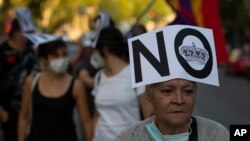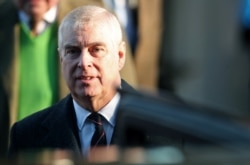The handwriting had been on the wall for Spain’s former and now disgraced King Juan Carlos since 2012. That was the year he took off for Botswana with his estranged mistress, a self-styled German princess, along with her son for an elephant shoot.
The safari, which infuriated Spaniards struggling with the economic woes of the global financial crash, became public thanks to a mishap that left Spain’s then-monarch with a broken hip. His flight this month, one apparently encouraged by his son, Felipe, the current king, was the almost inevitable outcome of nearly a decade of royal scandal and sleaze, involving not only allegations of affairs and high living, but of money laundering and multimillion-dollar payoffs.
Spain’s House of Bourbon isn’t alone among Europe’s 11 royal families battling the headwinds of public disapproval or forced to combat allegations of scandal, sleaze or graft.
Britain’s House of Windsor has been buffeted this year by public feuding among senior royals, and Queen Elizabeth’s favorite son, Prince Andrew, has been dogged by allegations that he had sex with a teenager trafficked by longtime friend Jeffrey Epstein, the late, disgraced New York financier.
Andrew’s entanglement with Epstein is becoming a transatlantic legal and political headache, royal aides acknowledge.
Meanwhile, the Danes have been questioning how much money they should be paying out for their royal family after it emerged Prince Frederick, the crown prince and heir apparent, and his Australian spouse, Mary Donaldson, have a “secret” house in Switzerland worth at least $2 million. Frederick’s brother, Prince Joachim, has been mired in multiple controversies over his expenses and partying.
In Belgium, Prince Laurent, the brother of Belgium's King Philippe, has continued to draw fire for an unruly lifestyle and allegations that he diverts public funds for personal use. He was fined by a court once for that and Belgium’s parliament has in the past docked his annual endowment.
Signs of erosion of public trust in monarchy have prompted politicians and commentators in some countries to question whether all of Europe’s royal families will survive the coming years amid a revival of calls for them to be written out of constitutions.
In Spain, anti-monarchy rallies have been mounted since the flight of the former king. Josep Maria Valles, a columnist for Spanish newspaper El Pais, says Juan Carlos has “damaged the credibility of a political edifice that has long shown severe symptoms of fatigue.”
Juan Carlos, who abdicated in 2014, is under investigation by Spain’s Supreme Court over corruption allegations, including a claim that he received a $100 million gift from the late King Abdullah of Saudi Arabia, linked to a contract a Spanish consortium won to build a rail line linking the Saudi cities of Mecca and Medina. Swiss prosecutors are also investigating allegations of the former monarch’s secret bank accounts and probing a $1.9 million donation from the ruler of Bahrain.
On Tuesday, royal officials confirmed that the 82-year-old former monarch had taken shelter in Abu Dhabi, where he is staying, according to Spanish media, in a $13,000-a-night hotel with an unnamed “faithful friend.” Juan Carlos’s fall from grace has been prolonged and stretched the patience of Spaniards.
For years, Spaniards overlooked rumors of his financial dealings and extravagant lifestyle and continued to regard him with respect for his role in guiding the country’s transition to democracy after the death of General Francisco Franco in 1975. Scandal, however, has worn away at his reputation and brought the country’s House of Bourbon into disrepute, damage that son Felipe is scrambling to repair before it risks the royal family’s survival. Public support for the monarchy is fading with only 50 percent of the Spanish wanting it to continue, according to recent opinion polls.
Monarchists say that, despite all the scandals, the royal family helps to attract foreign tourists and acts as a political stabilizing force. They point out it only costs the state about $8 million a year, considerably less than the other monarchies in Europe.
Critics say that far from stabilizing Spain, the monarchy has become divisive and isn’t helping the country solve continuing tensions between Madrid and regions that want independence or greater autonomy, like Catalonia. More than half, or 55 percent, of the population want a referendum on whether to abolish the monarchy, according to a YouGov poll published recently.
The coronavirus pandemic and its economic impact are not helping royal families and their defenders make their case for constitutional monarchy. Their lavish lifestyles rankle some of their subjects, who aren’t cushioned from lockdowns and worry about their own livelihoods. British monarchists have suggested that Britain’s royal family would lose millions in funding due to the pandemic.
That’s drawn a sharp retort from the anti-monarchist group Republic, which pointed out that while the royal family’s overall income might fall because of losses sustained from private investments, the annual grant paid by taxpayers to Queen Elizabeth and the family would not. “The palace wants to be seen to be suffering with the rest of us. What they're actually saying is that their low-paid staff will face job losses or pay freezes, but not the royal family,” said Graham Smith, a Republic spokesman.
In Belgium, disagreements over pandemic policy have revived calls from Flemish nationalists for a redrafting of the Belgian “confederation” with a much-reduced monarchy.
Downsizing might be the future for all of Europe’s monarchies — imposed or self-initiated, say analysts.
Even before the deepening Epstein saga involving Prince Andrew, and before the palace had to scramble to try to contain the fallout from the decision last year by Prince Harry and his wife, Meghan Markle, to move to the United States, Prince Charles, the heir apparent, had started to draft plans to “streamline” the royal family to reduce the number of “working royals.”
According to royal aides, Charles believes that fewer front-rank members means the institution would become more manageable, feuding would be minimized and less would go wrong.
“Charles has been saying for years and years, ‘Let’s make it smaller,’” Majesty magazine editor Ingrid Seward told reporters earlier this year. “He feels quite strongly that with such a big House of Windsor, there are too many opportunities for things to go wrong. And it’s too expensive. And they need too many houses, too much public expenditure,” she added.











